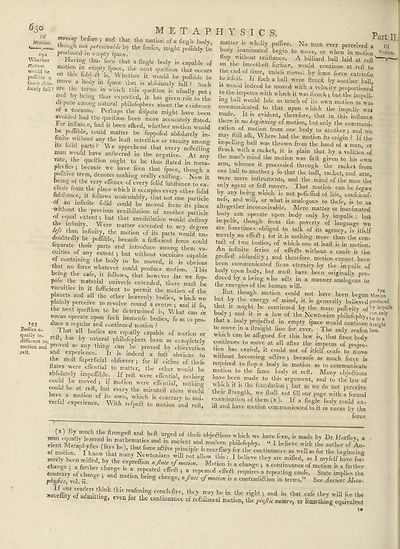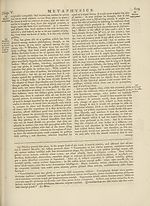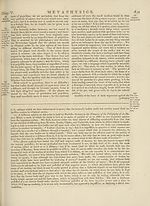Encyclopaedia Britannica, or, a Dictionary of arts, sciences, and miscellaneous literature : enlarged and improved. Illustrated with nearly six hundred engravings > Volume 13, MAT-MIC
(676) Page 630
Download files
Complete book:
Individual page:
Thumbnail gallery: Grid view | List view

6jo
metaphysics.
m,„L. brfore; a"d tI,at tl« motion of a fingk body,
-—v tholl^h not perceivable by the fenks, might poflibly be
19a produced in empty Ipace.
Whether Having thus been that a Angle body is capable of
would*1 he motl™ empty fpace, the next quellion that occurs
poffihle n (>n thls lubJ1^ is, Whether it would be poflible to
Ipace ablo- move a b‘>dy in fpace that is abfolutely full ? buch
lately full ? are the terms in which this queftion is ufually put;
and by being thus exprelied, it has given rife to the
di pute among natural philofophers about the exiftence
or a vacuum. Ptrliaps the difpute might have been
avoided had the queftion been more accurately ftated.
hor inllance, had it been afked, whether motion would
be poffible, could matter be fuppofed abfolutely in-
finite without any the leaft interftice or vacuity amono-
its loud parts ? W e apprehend that every reflebling
man would have anfwered in the negative. At any
rate the queftion ought to be thus ftated in meta-
phylics ; becaule we have feen that fpace, though a
poiitive term, denotes nothing really exifting. Now it
being oi the very effence of every folid fubftance to ex¬
clude from the place which it occupies every other folid
lubfiance, it follows undeniably, that not one particle
^. an indnite folid could be moved from its place
Without the previous annihilation of another paititle
of equal extent; but that annihilation would deftroy
the infinity. Were matter extended to any degree
lejs than infinity, the motion of its parts would un¬
doubtedly be poftible, becaufe a fufficient force could
separate thofe parts and introduce among them va¬
cuities of any extent ; but without vacuities capable
of containing the body to be moved, it is obvious
that no force whatever could produce motion. This
ting the cafe, it follows, that however far wre fup-
poie the material univerfe extended, there muft be
faculties in it fufficient to permit the motion of the
planets and all the other heavenly bodies, which we
plainly perceive to revolve round a centre ; and if fo
the next queftion to be determined is, W hat can in
vacuo operate upon fuch immenfe bodies, fo as to pro-
193 a regular and continued motion ?
quallyS in". ^ a.]1 b(xilt's are equally capable of motion or
different to, relt’ ^ natu.raI philofcphers been as completely
motion and Pr,dVed as any thing can be proved by obfervation
.reft. and experience. _ It is indeed a faeft obvious to
the molt fuperfieial obferver ; for if either of thefe
ftates were effential to matter, the other would be
abfolutely impofiible. If reft were effential, nothing
coud be moved; if motion were effential, nothing
comd be at reft, but every the minuteft atom would
have a motion of its own, which is contrary to uni-
Vdfal experience. With refpea to motion and reft,
Part II.
matter is wholly paffive. No man ever perceived a Of
buoy in animated begin to move, or when in motion Motion.
Itop without refiftance. A billiard ball laid at reft '■“"'V'"—'
on the fmootlieft furfaee, would continue at reft to
tiie end of time, unlefs moved by feme force extrinfic
to itfeit. ^ Ii fuch a ball were {truck by another ball
it would indeed be moved with a velocity proportioned
to the impetus with which it M as ftruck; but the impell¬
ing ball would lofe as much of its own motion as was
communicated to that upon which the impulfe was
made.. It is evident, therefore, that in this inftance
tnere is no beginning of motion, but only the communi¬
cation of motion from one body to another; and we
may ftill afk, Where had the motion its origin ? If the
impelling ball was thrown from the hand of a man, or
ftiuck with a racket, it. is plain that by a volition of
the man’s mind the motion was firft given to his own
arm, whence it proceeded through the racket from
one ball to another ; fo that the ball, racket, and arm,
were mere inftruments, and the mind of the man the
only agent or firft mover. That motion can be/Wa*
by any being which is not poffeffed of life, confciouf-
nels, and will, or what is analogous to thefe, is to us
altogether inconceivable. Mere matter or inanimated
body can operate upon body only by impulfe : but
impulfe, though from the poverty of language we
are fometimes obliged to talk of its agency, is itfelf
merely an effeft.; for it is nothing more than the con¬
tact of two bodies, of which one at leaft is in motion.
An infinite feries of effedfs without a caufe is the
gr< ffeft abfurdity ; and therefore motion cannot have
been communicated from eternity by the in.pulfc of
body upon body, but muft have bee"n originally pro¬
duced by a being v ho afts in a manner analogous to
the energies of the human will.
But though motion could not have been begun Motfol
but by the energy of mind, it is generally believed produced
that it might be continued by the mere pafiivity 0f k inipuife
body; and it is a law of the Newtonian philofophv "‘nonly
that a body projecT d in empty fpace would continue ttraftht
to move in a ftraight line for ever. The only reafon line,
which can be afligned for this law is, that fince body
continues to move at all after the impetus of projec¬
tion has ceafed, it could not of itfelf ceafe to move
without becoming active ; becaufe as much force is
required to flop a body in motion as to communicate
motion to the fame body at reft. Many objedions
have been made to this argument, and to the law of
which it is the foundation 5 but as we do not perceive
theii .ftrength, we ftiall not fill our page with a formal
examination of them (r). If a Angle body could ex¬
it! and have motion communicated to it in vacuo by the
force
and belt urged of tlefe objeftions rvbieh we hove f en, is made by Dr Forfley a
"ntXtlbZIf a"dfW phil"<<,l’l,>'- “ I believe wilh lYeTulW „7^
ef motion j'k m i tl t tbat aftive principle is neceflary for the continuance as well as for the beginning
ISybeen JiM f' T ^ M ^1 ** ^ - I -yfelf 37*
Change ; a farther change is a ^a chan8'e 5 a continuance of motion is a farther
contrary of change • and mol inn ’ * ^pcated eftetft requires a repeating caufe. State implies the
pbg/fcsjvoh ii. g ’ 1 being Change’ a^“le ofmot20n " a contradiction in terms.” See Ancient Meta-
HeLffilv of admiuinf ^ Tf°™nS con.clnfive, they may be in the right ; and in that cafe they will fee the
V g, ven for the continuance of redtilintal motion, the jj/aJic nature, or fomething equivalent
t*
metaphysics.
m,„L. brfore; a"d tI,at tl« motion of a fingk body,
-—v tholl^h not perceivable by the fenks, might poflibly be
19a produced in empty Ipace.
Whether Having thus been that a Angle body is capable of
would*1 he motl™ empty fpace, the next quellion that occurs
poffihle n (>n thls lubJ1^ is, Whether it would be poflible to
Ipace ablo- move a b‘>dy in fpace that is abfolutely full ? buch
lately full ? are the terms in which this queftion is ufually put;
and by being thus exprelied, it has given rife to the
di pute among natural philofophers about the exiftence
or a vacuum. Ptrliaps the difpute might have been
avoided had the queftion been more accurately ftated.
hor inllance, had it been afked, whether motion would
be poffible, could matter be fuppofed abfolutely in-
finite without any the leaft interftice or vacuity amono-
its loud parts ? W e apprehend that every reflebling
man would have anfwered in the negative. At any
rate the queftion ought to be thus ftated in meta-
phylics ; becaule we have feen that fpace, though a
poiitive term, denotes nothing really exifting. Now it
being oi the very effence of every folid fubftance to ex¬
clude from the place which it occupies every other folid
lubfiance, it follows undeniably, that not one particle
^. an indnite folid could be moved from its place
Without the previous annihilation of another paititle
of equal extent; but that annihilation would deftroy
the infinity. Were matter extended to any degree
lejs than infinity, the motion of its parts would un¬
doubtedly be poftible, becaufe a fufficient force could
separate thofe parts and introduce among them va¬
cuities of any extent ; but without vacuities capable
of containing the body to be moved, it is obvious
that no force whatever could produce motion. This
ting the cafe, it follows, that however far wre fup-
poie the material univerfe extended, there muft be
faculties in it fufficient to permit the motion of the
planets and all the other heavenly bodies, which we
plainly perceive to revolve round a centre ; and if fo
the next queftion to be determined is, W hat can in
vacuo operate upon fuch immenfe bodies, fo as to pro-
193 a regular and continued motion ?
quallyS in". ^ a.]1 b(xilt's are equally capable of motion or
different to, relt’ ^ natu.raI philofcphers been as completely
motion and Pr,dVed as any thing can be proved by obfervation
.reft. and experience. _ It is indeed a faeft obvious to
the molt fuperfieial obferver ; for if either of thefe
ftates were effential to matter, the other would be
abfolutely impofiible. If reft were effential, nothing
coud be moved; if motion were effential, nothing
comd be at reft, but every the minuteft atom would
have a motion of its own, which is contrary to uni-
Vdfal experience. With refpea to motion and reft,
Part II.
matter is wholly paffive. No man ever perceived a Of
buoy in animated begin to move, or when in motion Motion.
Itop without refiftance. A billiard ball laid at reft '■“"'V'"—'
on the fmootlieft furfaee, would continue at reft to
tiie end of time, unlefs moved by feme force extrinfic
to itfeit. ^ Ii fuch a ball were {truck by another ball
it would indeed be moved with a velocity proportioned
to the impetus with which it M as ftruck; but the impell¬
ing ball would lofe as much of its own motion as was
communicated to that upon which the impulfe was
made.. It is evident, therefore, that in this inftance
tnere is no beginning of motion, but only the communi¬
cation of motion from one body to another; and we
may ftill afk, Where had the motion its origin ? If the
impelling ball was thrown from the hand of a man, or
ftiuck with a racket, it. is plain that by a volition of
the man’s mind the motion was firft given to his own
arm, whence it proceeded through the racket from
one ball to another ; fo that the ball, racket, and arm,
were mere inftruments, and the mind of the man the
only agent or firft mover. That motion can be/Wa*
by any being which is not poffeffed of life, confciouf-
nels, and will, or what is analogous to thefe, is to us
altogether inconceivable. Mere matter or inanimated
body can operate upon body only by impulfe : but
impulfe, though from the poverty of language we
are fometimes obliged to talk of its agency, is itfelf
merely an effeft.; for it is nothing more than the con¬
tact of two bodies, of which one at leaft is in motion.
An infinite feries of effedfs without a caufe is the
gr< ffeft abfurdity ; and therefore motion cannot have
been communicated from eternity by the in.pulfc of
body upon body, but muft have bee"n originally pro¬
duced by a being v ho afts in a manner analogous to
the energies of the human will.
But though motion could not have been begun Motfol
but by the energy of mind, it is generally believed produced
that it might be continued by the mere pafiivity 0f k inipuife
body; and it is a law of the Newtonian philofophv "‘nonly
that a body projecT d in empty fpace would continue ttraftht
to move in a ftraight line for ever. The only reafon line,
which can be afligned for this law is, that fince body
continues to move at all after the impetus of projec¬
tion has ceafed, it could not of itfelf ceafe to move
without becoming active ; becaufe as much force is
required to flop a body in motion as to communicate
motion to the fame body at reft. Many objedions
have been made to this argument, and to the law of
which it is the foundation 5 but as we do not perceive
theii .ftrength, we ftiall not fill our page with a formal
examination of them (r). If a Angle body could ex¬
it! and have motion communicated to it in vacuo by the
force
and belt urged of tlefe objeftions rvbieh we hove f en, is made by Dr Forfley a
"ntXtlbZIf a"dfW phil"<<,l’l,>'- “ I believe wilh lYeTulW „7^
ef motion j'k m i tl t tbat aftive principle is neceflary for the continuance as well as for the beginning
ISybeen JiM f' T ^ M ^1 ** ^ - I -yfelf 37*
Change ; a farther change is a ^a chan8'e 5 a continuance of motion is a farther
contrary of change • and mol inn ’ * ^pcated eftetft requires a repeating caufe. State implies the
pbg/fcsjvoh ii. g ’ 1 being Change’ a^“le ofmot20n " a contradiction in terms.” See Ancient Meta-
HeLffilv of admiuinf ^ Tf°™nS con.clnfive, they may be in the right ; and in that cafe they will fee the
V g, ven for the continuance of redtilintal motion, the jj/aJic nature, or fomething equivalent
t*
Set display mode to:
![]() Universal Viewer |
Universal Viewer | ![]() Mirador |
Large image | Transcription
Mirador |
Large image | Transcription
Images and transcriptions on this page, including medium image downloads, may be used under the Creative Commons Attribution 4.0 International Licence unless otherwise stated. ![]()
| Permanent URL | https://digital.nls.uk/192692835 |
|---|
| Attribution and copyright: |
|
|---|
| Description | Ten editions of 'Encyclopaedia Britannica', issued from 1768-1903, in 231 volumes. Originally issued in 100 weekly parts (3 volumes) between 1768 and 1771 by publishers: Colin Macfarquhar and Andrew Bell (Edinburgh); editor: William Smellie: engraver: Andrew Bell. Expanded editions in the 19th century featured more volumes and contributions from leading experts in their fields. Managed and published in Edinburgh up to the 9th edition (25 volumes, from 1875-1889); the 10th edition (1902-1903) re-issued the 9th edition, with 11 supplementary volumes. |
|---|---|
| Additional NLS resources: |
|

